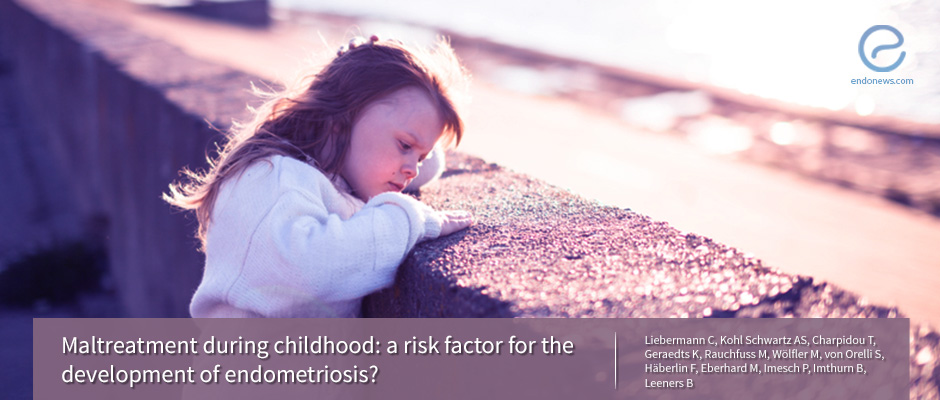Maltreatment during childhood: a risk factor for the development of endometriosis?
Jul 20, 2018
Evidence suggests that maltreatment during childhood could be associated with the diagnosis of endometriosis
Key Points
Highlights
- In this study, childhood sexual abuse, emotional abuse, emotional neglect, and inconsistency experiences were associated with the diagnosis of endometriosis.
- Healthcare professionals should consider a link to maltreatment during childhood (MC) in women with endometriosis.
Importance
- This study sheds light on the association between MC and endometriosis, a topic on which limited research exists.
What’s Done Here
- Data from women with a diagnosis of endometriosis was compared to data from women without a diagnosis of endometriosis.
- Data from 421 women in each group were statistically analyzed.
- Questionnaires were administered to collect demographic information and MC information.
- MC was assessed using the Childhood Trauma Questionnaire, which includes five questions each on physical and emotional abuse, emotional neglect, sexual abuse and physical neglect, and three additional questions which capture ‘inconsistency experiences’ in the child’s family.
Key Results
- Women with a diagnosis of endometriosis reported higher rates of sexual abuse, emotional abuse, emotional neglect, and inconsistency experiences than control women.
- No difference was observed between the groups in terms of physical abuse/neglect experiences.
- All women reported similar rates of the severity of MC, with the exception of a higher average intensity of emotional abuse in women diagnosed with endometriosis than in control women.
Limitations of the Study
- The data collected was self-reported, which may mean that recall bias was involved.
- Self-administration of the questionnaires may cause bias because of misunderstandings related to subtle differences in MC.
- The ethnic background of study participants was very homogenous (92% of the women in both groups were Caucasian), limiting generalizability of the results.
Lay Summary
There is still no clear explanation for why a woman develops endometriosis. Genetics, lifestyle factors, environmental factors during childhood and immunological mechanisms are all believed to contribute to the development of this condition.
Environmental factors during childhood include maltreatment and evidence demonstrate that this influences the health of individuals. Maltreatment during childhood (MC) is associated with higher morbidity and mortality from other chronic diseases and increased number of gynecological and obstetrical complications. In addition, MC correlates with having a chronic inflammatory state. Liebermann et al, from the Department of Reproductive Endocrinology of the University Hospital Zurich, Switzerland, therefore, explored the association between sexual abuse, emotional abuse/neglect, physical abuse/neglect, inconsistency experiences (A lack of perception by parents of concerns of the child as well as aggressive or unpredictable behavior leads to inconsistency experience) and the diagnosis of endometriosis; and reported their findings in the recent issue of Human Reproduction.
When women with a diagnosis of endometriosis and the control group were compared, they displayed similar demographics. Key differences observed were that women with a diagnosis of endometriosis reported higher rates of sexual abuse, emotional abuse, emotional neglect, and inconsistency experiences than control women, however, no difference was observed between the groups in terms of physical abuse/neglect experiences. All women reported similar rates of the severity of MC, with the exception of a higher average intensity of emotional abuse in women diagnosed with endometriosis than in control women.
The authors comment that this study is one of few to evaluate the association between MC and endometriosis and that the findings are consistent with that of a meta-analysis which shows an association between MC and an increased risk for adverse adult physical health including gynecological problems.
The finding that there is no association between having endometriosis in women with physical abuse/neglect experiences is consistent with one study and in contrast to another. The authors comment that a larger sample is needed to clarify the association between physical abuse/neglect experiences and endometriosis.
The finding that emotional abuse/neglect is associated with endometriosis is consistent with studies that show that neglect is associated with psychological problems and that women with endometriosis show a higher incidence of psychological issues. However, it is not yet clear whether depression exists before the development of endometriosis or develops as a consequence of the condition.
It is already known that the immune system plays an essential role in the development of endometriosis. The authors speculate that MC may have a role in the development of endometriosis by leading to a persistent inflammatory state.
The authors conclude that healthcare professionals should consider a link to MC in women with endometriosis as the long-term effects of MC can be prevented through effective strategies. If a link to MC is determined, early intervention is ideal for such patients.
Research Source: https://www.ncbi.nlm.nih.gov/pubmed/29947745
endometriosis childhood trauma questionnaire (CTQ) sexual abuse physical abuse emotional abuse and neglect maltreatment during childhood

